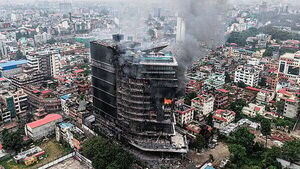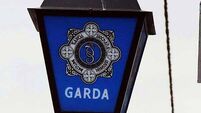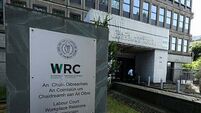'We could hear gunshots and ambulances all day': Irish woman in Nepal during unrest

Kenneth Fox
An Irishwoman in Nepal said the situation is still "incredibly volatile," as a curfew is in place after multiple days of violence.
Trouble erupted last Monday when a group of young protestors staged a demonstration in the country's capital, Kathmandu, to protest against corruption, nepotism, and restrictions on social media.
It escalated rapidly when security forces opened fire on protestors, killing 30 people.
By Tuesday, protesters had torched the parliament, the Supreme Court and multiple government offices, including Singha Durbar – the central administrative complex.
Police stations were overrun, political leaders' homes attacked and Tribhuvan International Airport closed. Since then, the army has been deployed to restore order.
Brid Gavin O’Connell, a 66-year-old retired healthcare worker from Galway who has visited Nepal many times, said she has never witnessed anything on this scale.
“It is terrible. Nepal has not had it easy the past few years, especially with the earthquake in 2015. This is at a scale I have never seen.
"The Gen Z generation came out to demonstrate against the corruption in the Nepalese government. They were calling for accountability and transparency."

Billowing smoke
When the protestors were shot, there was a huge uproar over it, as on the second day [September 9th], they burnt the parliament building.
“We could see thick black smoke billowing up into the air. We could hear gunshots and ambulance sirens all day," she said.
Amid the chaos, people took advantage of the situation with riots and looting taking place across the city.
She spoke to some of the locals who believe the burning of some buildings was actually done by those in power, taking the opportunity to burn any record of their corruption.

Either way, the situation in the country quickly deteriorated. “When the curfew is in place, we don’t go out," she said, adding that the airport was initially closed but has since been reopened.
Even day-to-day errands have become an issue as society has started to unravel.
"We went to the shop this morning and tried to buy some bread, but there was no bread because there were no deliveries. ATMs were closed as well, so people had to be mindful of the little money they had. Schools and colleges have also been closed," she said.
She is lucky that the people she is staying with have running water and electricity.
As most people are staying inside away from the anarchy, social media has become crucial to piece together what happened.
“We have seen videos of people being shot in the head, and their friends standing right beside them.”
“We have seen videos of people being shot in the head, and their friends standing right beside them. The anger is really high, and people are just trying to mourn their loved ones.”
At the moment, she is hoping her flights back to Ireland will run as scheduled, but as she said, "that is a first-world problem compared to what they are going through.”
The latest update is that her flight to Dubai has been delayed, meaning she will miss the connecting flight to Dublin.
Her main concern now is that her medication could run out. “I have been gone since August 13th, and even though I brought more than I needed, I could not stay here forever."

Her friend's daughter is also studying in Ireland, so she is trying to get back for the start of the semester on Monday.
Even as things have quieted down from the early in the week, there is still a looming sense of uncertainty.
“The army was brought out last night, but we did not go near the areas where people have protested.”
“When we go up to the roof of where we are staying, you can hear the sound of protestors and gunshots. We were able to see the police station on fire from there as well.
Things really hit home when someone staying in the same building went out and asked her to take care of her kids.
"The children are seven and three, and it just dawned on me what if she were killed? They would be left thinking 'Why did mammy not come back?" she said.





